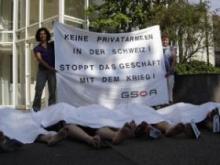Action Against Private Military Security Companies in Switzerland
Nina Regli
The wars in Iraq and Afghanistan arrived in Switzerland this year: a Swiss newspaper reported that Aegis Defence Service, one of the biggest private security companies, had opened a holding base in Basel. Aegis Defence Service, based primarily in London, employs 20,000 mercenaries in Iraq and Afghanistan who typically work on contract for the American defence ministry.
Following the report, GSoA (Group Switzerland without an Army) organised a street protest in front of Aegis Defence's Seat in Basel: A dozen GSoA activists lay down in front of Aegis's entrance door, covered with a shroud to symbolise war victims caused of Private Military Security Companies (PMSCs) like Aegis. The action evoked a wide media response and resulted in public discussions about PMSCs in Switzerland.
GSoA, with its focus on national and international demilitarisation, has a long history campaigning against those who profit from war. In 2009, GSoA instigated a national referendum on a ban on the export of weapons, but unfortunately the vote was lost. Sadly, the international arm trade and the activities of Private Security and Military Services (PMSCs) has recently increased to record levels. Since 1990, the value of PMSCs has increased from 33 billion US dollars to nearly 200 billion. Since the end of the cold war, when most of western armies were restructured and military jobs outsourced, PMSCs have experienced a strong revival, and today dozens of PMSCs bustle in Middle Eastern battlefields.
The shift from national armies to mercenaries is politically convenient for governments of belligerent countries – what better way to avoid criticism over the number of soldiers killed in combat? In Afghanistan today there are around 50% more people employed by PMSCs than soldiers working on the ground. With the withdrawal of US troops in Iraq, mercenaries are filling the gaps.
The increasing privatisation of conflicts is causing problems for international law. A clear definition of PMSCs is yet to be created, and the Geneva Convention is yet to include the activities of PMSCs. On a national level, PMSCs operate outside of the boundaries of democratic control. The lack of international and national controls means that PMSCs and their employers largely escape any penalties for their actions.
GSoA doesn't only criticise the privatisation of wars in general, but also demands for a ban of PMSCs in Switzerland. As the depositary state of the Geneva Convention and a neutral state at that, Switzerland has certain special responsibilities. While there are strict laws for mercenaries in Switzerland - Swiss citizens aren't by law allowed to do any mercenary work – there aren't any laws restricting foreign private security companies with mandates abroad.
Following political pressure from GSoA and others regarding the establishment of Aegis in Basel, the Swiss government announced that it would enforce stricter controls over PMSCs in Switzerland. Furthermore, the UN plans to introduce a new code of conduct aimed at ensuring PMSCs respect the principles of international human rights and international humanitarian law.
It is obvious that more effort is needed to ensure that PMSCs are held accountable for their actions and that malevolence and foul play are penalised in a court of law. GSoA continues its fight against profiteers of war. Jo Lang , Green parliamentarian and member of the GSoA-committee, demanded in the Swiss parliament an immediate ban on PMSCs in Switzerland. An answer from the government is expected.

Neuen Kommentar hinzufügen